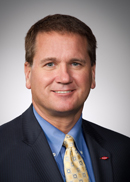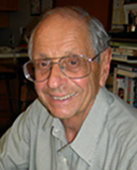Careers: Interviews
Gregory Grocholski International President, Howard "Bud" Friedman Founding Pioneer, ISACA
This week, Stephen Ibaraki, FCIPS, I.S.P., ITCP/IP3P, MVP, DF/NPA, CNP, FGITCA has an exclusive interview with Gregory Grocholski and Howard "Bud" Friedman.
 International President Gregory Grocholski, CISA, is corporate auditor at The Dow Chemical Company, where he is responsible for independently assessing the adequacy of accounting, financial, operating and technology controls of Dow's global operations. In this role, Grocholski has responsibility for corporate auditing, fraud investigative services and contract auditing. In addition, he is a standing ad hoc member of Dow's global and regional ethics and compliance committees. Currently, he is a member of ISACA's Strategic Advisory Council and Governance Advisory Council. He has been chair of ISACA's Finance Committee, Assurance Committee and Knowledge Board, and member of ISACA's Audit Committee, Professional Influence and Advocacy Committee, and Professional Issues Task Force. He is a board member of the Bay Area Chamber of Commerce, Vice President of Michigan Baseball Operations and a member of Northwood University's Accounting Advisory Council. International President Gregory Grocholski, CISA, is corporate auditor at The Dow Chemical Company, where he is responsible for independently assessing the adequacy of accounting, financial, operating and technology controls of Dow's global operations. In this role, Grocholski has responsibility for corporate auditing, fraud investigative services and contract auditing. In addition, he is a standing ad hoc member of Dow's global and regional ethics and compliance committees. Currently, he is a member of ISACA's Strategic Advisory Council and Governance Advisory Council. He has been chair of ISACA's Finance Committee, Assurance Committee and Knowledge Board, and member of ISACA's Audit Committee, Professional Influence and Advocacy Committee, and Professional Issues Task Force. He is a board member of the Bay Area Chamber of Commerce, Vice President of Michigan Baseball Operations and a member of Northwood University's Accounting Advisory Council.
 Howard "Bud" Friedman is an early leader of ISACA and past International President of the association (1973-1974). Howard "Bud" Friedman is an early leader of ISACA and past International President of the association (1973-1974).
Friedman began his career as a computer operator at North American Aviation on one of the first large mainframe computers. From there, he moved on to Northrop Corporation as a computer auditor. In 1974, he became a consultant for the public accounting firm Coopers & Lybrand, using computers to assist attorneys in evidence collection. In 1982, he returned to Northrop Corporation as director of internal audit, where he stayed until his retirement in 1994.
To listen to the interview, click on this MP3 file link
The latest blog on the interview can be found in the IT Managers Connection (IMC) forum where you can provide your comments in an interactive dialogue.
http://blogs.technet.com/b/cdnitmanagers/
DISCUSSION:
Interview Time Index (MM:SS) and Topic |
| :00:29: | | Greg and Bud, thank you for sharing your deep experiences with our audience.
:00:34: Greg Grocholski: "....Thank you for the opportunity...."
:00:35: Bud Friedman: "....Thank you Stephen...."
|
| :00:38: | | Bud can you profile your founding role with ISACA and ISACA's evolution.
:00:48: Bud: "....The best way to start this is before I got involved....In December 1971, I came to a meeting of the association in the Roger Young Auditorium in Los Angeles, seeking to find out about the EDPAA and to join it....What I did find out was that the Board of Directors had resigned en masse, except for Gene [Franks], because of conflicting personal reasons. We talked and Gene convinced me to join him and try to determine if others would be interested in keeping the association going...."
|
| :03:28: | | Greg, can you profile your involvement with ISACA and your specific measurable goals during your term of office?
:03:32: Greg: "....I share similar passions and similar interests with Bud and the creators of ISACA and I think a lot of the members of the organizations do as well....My involvement goes back twenty years, but I think the passion and the goals are the same....When it comes to measurable goals during the term of office, as the board we try to set the strategy and if the strategy is successful obviously the measurable components will be there...."
|
| :07:34: | | Bud, what would you like to share about your work outside of ISACA and valuable shareable lessons?
:07:39: Bud: "....I retired in 1994. I was at Northrop Corporation at the time and what I'm going to say makes a comparison I think between the old days and what it is today....Auditors then were primarily financial with financial backgrounds and what they did was audit around the computer. What I was trying to bring to the table, which I think I did effectively through the organization at EDPAA, was how to audit within the computer...."
|
| :09:43: | | Greg, can you profile your history and roles outside of ISACA as well and valuable shareable lessons?
:09:48: Greg: "....For me the valuable lesson is: complacency is really a career-ending attribute. You just have to continue to adapt and adopt the best and change accordingly as the world and events occur around you...."
|
| :13:33: | | Greg, what were the five top takeaways from the ISACA World Congress that provide value to governments, industry, and academia?
:13:42: Greg: "....My first, second and third takeaways was ICE (Innovation, Collaboration, and Execution). The fourth takeaway was a discussion on outsourcing.....The fifth takeaway (towards the end of the conference) was a discussion on the emerging technologies...."
|
| :17:45: | | Bud, what is your perspective on the recent ISACA World Congress?
:17:52: Bud: "....It was very huge and very impressive and I think I can clarify that by simply describing how we were in the beginning and what I saw a few weeks ago....Just seeing ISACA's current World Congress meetings in San Francisco which represented an organization that has 100,000 plus members, has 198 Chapters in 81 countries and has 73 million dollars in total assets. Very, very impressive compared to the 200 dollars or so that we had when we first started...."
|
| :20:12: | | Greg and Bud, what are some of the top disruptive technologies and how will they have impact?
:20:21: Greg: "....'Bring Your Own Device' activity and how it's secured in companies and vulnerabilities that are brought with it....Continued use of robotic technologies....Further developments into the consumer and technology space...."
:23:21: Bud: "....I'm going to leave that one to Greg I think because I retired in 1994 and technology has moved significantly in those 18 years. ..."
|
| :23:56: | | What are your thoughts on computing as a recognized profession with demonstrated professional development, adherence to a code of ethics, and recognized non-licensing based credentials?
[See www.ipthree.org and the Global Industry Council, http://www.ipthree.org/about-ip3/global-advisory-council]
:24:20: Bud: "....When I was in the business, I was part of the computer community (from 1956 and from there on afterwards), I saw computers grow from vacuum tube mainframe devices to what it is today. From what I know of it today, it is a recognized profession with many, many, many professional attributes...."
:25:05: Greg: "....To me credentialing demonstrates a valid understanding of the area or technologies for which the credential serves. Again, it's this complacency issue; you have to continue to adapt, to adopt and to learn. The one venue of doing that is certainly the credentialing venue. To me that adds value to your career and value to the profession...."
|
| :26:17: | | Greg, Bud, if you were conducting this interview, what one question would you ask and then what would be your answer?
:26:23: Greg: "....What does the next 43 years hold for ISACA?...."
:27:11: Bud: "....Why do you continue to have such a high interest in ISACA and what it represents?"
|
| :27:41: | | Greg and Bud, with your demanding schedules, we are indeed fortunate to have you come in to do this interview. Thank you for sharing your deep experiences with our audience.
"....Thank you Stephen...."
|
Music by Sunny Smith Productions and Shaun O'Leary |
|
